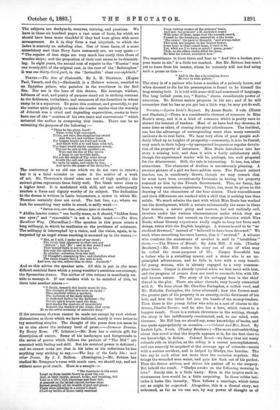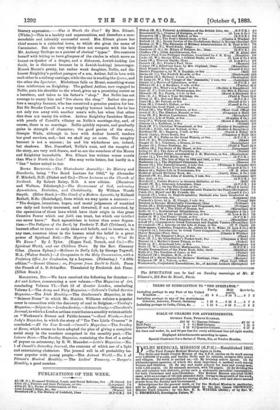NOVEL8. — Squire Lisle's Bequest. By Annie Beale. 3 vols. (Hurst and
Blackett.)—There is a considerable element of romance in Miss Beale's story, and it is a kind of romance which is pretty sure to attract the interest of readers. Most of as have had day-dreams, at some time or other, of coming into great inheritances. The incident, too, has the advantage of corresponding more than many romantic incidents do to real facts. We hear very often of poor people sud- denly lifted up to heights of prosperity—commonly, it is to be feared, very much to their injury—by unexpected bequests or regular devolu- tion of the property of intestates. Miss Beale introduces into her story a missing heir, and does it with a fairly satisfactory skill, though the experienced reader will be, perhaps, too well prepared for the denouement. Still, the tale is interesting. It has, too, other attractions. The character of Avelino is uncommonly pleasing. A sweeter picture of a girl we have seldom seen. The French retired teacher, too, is excellently drawn, though we may remark that he must have been exceptionally fortunate in having his property restored to him by the French Government. This, we fancy, has been a very uncommon experience. Praise, too, must be given to the drawing of the characters of the four sisters. Their resemblances and their differences are marked with a skill that is nothing less than subtle. We much admire the tact with which Miss Beale has worked out the development, which a nature substantially the same in these four women, a nature petty and narrow, but not radically- evil, receives under the various circumstances under which they are placed. We cannot but remark on the strange liberties which Miss Beale, whose literary experience really ought to keep her from each doings, takes with the English language. A woman is said to be "ac credited drowned," instead of "believed to have been drowned." We read, when something becomes known, that it "evolved." A witness who confirms the statements of another is said to "invalidate" them.—The Waters of Marah. By John Hill. 3 vols. (Tinsley Brothers.)—Mr. Hill makes his story. out of one of what may be called the cross-purposes of life. Caspar Rosenfeld has a father who is a swindling usurer, and a sister who is an =- principled adventuress, and he falls in love with a very beauti- ful young woman, who is already engaged to a very common- place lover. Caspar is already cynical when we first meet with him, and the progress of events does not tend to reconcile him with life and human nature. The story of his unhappy love is the chief thread in the plot. There are other threads, very loosely connected with it. We hear about Mr. Claudius Faringdon, a selfish roué, and Mr. Malcolm Faringdon, the lover aforesaid ; how the former sank the greater part of his property in an annuity, to the detriment of his heir, and how the latter fell into the hands of the money-lenders. Then there is the young fellow who acts as a sort of chorea to the drama, Charlie Deane ; and be also has a love, which comes to a happier result. There is a certain cleverness in the writing, though the story is but indifferently constructed, and, to our mind, even tiresome. Mr. Hill has, we should say, some knowledge of books, and can quote appropriately on occasion.—Colonel and Mrs. Revel. By Laslett Lyle. 3 vols. (Tinsley Brothers.)—The most noticeable thing about this novel is that the bicycle appears in it, for the first time to our knowledge, in fiction. Colonel Revel—we fancy that not many colonels ride on bicycles, as the riding is a recent accomplishment, and can scarcely be acquired at the average age of colonels—meets with a serious accident, and is helped by Gladys, the heroine. The two say to each other not more than the occasion requires. She brings the wounded man water, and gets his flask out of his pocket. Then the doctor arrives, and drives his patient off to the surgery. But behold the result. "Gladys awoke on the following morning in love." Surely this is a little hasty. Even in the tropics such in- stantaneous love would be a little surprising. In these colder lati- tudes it looks like insanity. Then follows a marriage, which turns out as might be expected. Altogether, this is a dismal stray, not redeemed, as far as we can see, by any power of thought or of
literary expression.—Was it Worth the Cost ? By Mrs. Eiloart. (White.)—This is a healthy and unpretentious, and therefore a com- mendable and tolerably successful novel. Mrs. Eiloart places her chief scenes in a cathedral town, to which she gives the name of Carminster. But she very wisely does not compete with the late Mr. Anthony Trollope as a painter of clerical "types." She contents herself with letting us have glimpses of the circles in which move an
' honest ex-Quaker of a draper, and a dishonest, Jewish-looking (no doubt, he is dishonest because he is Jewish-looking) ironmonger. Honest Mount's pretty, but rather weak daughter, Nellie, and dis- honest Keightley's perfect paragon of a son, Arthur, fall in love with each other in a railway-carriage, while the one is reading the Queen, and the other the Spectator. Misfortune falls on Mount, something worse than misfortune on Keightley. The gallant Arthur, now engaged to Nellie, puts his shoulder to the wheel, gives up a promising career as a barrister, and takes to his father's "shop." But Nellie has not courage to marry him and "live above the shop." Rather she pre- fers a naughty baronet, who has conceived a genuine passion for her. But Sir Brooke Cornill is a very naughty baronet indeed, for he has not only run away with another man's wife, but when that other dies does not marry his widow. Arthur Keightley furnishes Mount with proofs of Cornill's villainy on Nellie's marriage-day, and, of course, there is no marriage. Nellie quickly repents, and gradually gains in strength of character; the good genius of the story, Georgie Wade, although in love with Arthur herself, tenders her good services, and,—but we shall say no more. The naughty baronet is not a success ; he and his wickedness are, indeed, but shadows. Mrs. Pounsford, Nellie's aunt, and the marplot of the story, are very well drawn, and so are the members of the Mount and Keightley households. Mrs. Eiloart has written worse novels than Was it Worth the Cost ? She may write better, but hardly in a " line " better suited to her.



































 Previous page
Previous page